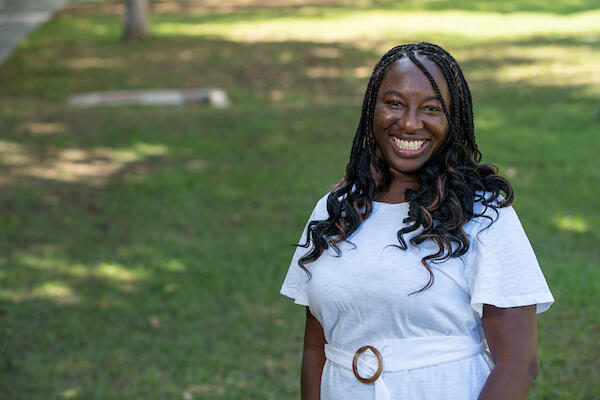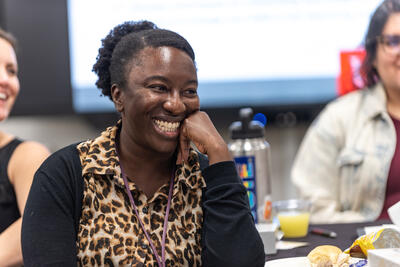

Adjoa Mensah is set to make waves. Hailing from a different country with diverse perspectives, she is just the woman to show the education world how to stay relevant and reach new heights. Now in the third year of her doctoral studies, her research focuses on preparing future teachers to integrate technology into K-12 classrooms. Through her research and role within the College of Education, she looks for ways for pre-service teachers, who are undergraduate students preparing to enter the classroom professionally, to understand and develop strategies to facilitate relevant and transformative uses of technology to meet the needs of their students and our ever-evolving world.
Questioning the Current
Adjoa's journey to academia wasn't always straightforward. Growing up in a city just outside Toronto, Canada, she was continually exposed to endless possibilities. As a child of Ghanaian immigrants who were also teachers, the value of education was ingrained in her from the start. But she didn't see her future in the classroom. Instead, she studied psychology at Western University where she earned her first degree.
After graduation, Adjoa began volunteering at an elementary school to bolster her resume. She recalls enjoying the many ways she could use her creativity to design interesting lesson plans. She discovered a passion for teaching that would shape the rest of her life. “When I was using tech and loving tech in the classroom, I started to question, ‘why isn't everyone else doing this?’” And so her journey to teaching and later becoming a teacher of preservice teachers as well as a scholar began.
Adjoa went on to become a K-8 teacher for 15 years, teaching both French and English with a growing interest in STEM education. Soon she began experimenting with technology in the classroom, and facilitating professional development courses for primary teachers.
She noticed a disconnect between education's use of technology in contrast to its use at large. Teachers claim to be using technology in the classroom, but often fail to do so in a transformative way. Instead, Adjoa's research shows they are using tech as a replacement. For example, many teachers point to their use of PowerPoint to present topics as an effective use of technology. While many of us would agree, Adjoa regards PowerPoint as a replacement for a poster presentation. Given that the use of the software is not hands-on for the student, it does not change their learning experience.
Bridging a Bumpy Digital Landscape
After leaving Canada, Adjoa came to the U.S. with a diverse perspective on education. Though the two nations share a border, the education systems in Ontario and Nevada are very different, especially when it comes to tech.
For example, Nevada teachers and students do not have equal access to tech. “My school was one [device] to one [student], so access wasn't an issue [...]. Here, teachers generally don't use tech in the learning environment unless they have it readily available.” Some CCSD schools have a cart of laptops and tablets for multiple classrooms to share, others have SMART Boards and some teachers only use tech resources in one-off instances. In truth, teachers sometimes misuse tech access treating it as a reward or even as a behavioral tool when dealing with disruptive students.
Debunking the Digital Native Myth
Compounding the challenge is the fact that many pre-service teachers don’t know how to use the tech they have. There are even instances where teachers still have negative or limiting attitudes toward tech in educational environments. But how could this be possible? How could an incoming wave of teachers dubbed “digital natives,” who were raised with tech constantly within reach, not use it in their own classrooms. For a while, there was an assumption that this would just happen naturally.
Adjoa’s research has determined this to be a myth. “Before teacher preparation, and sometimes after, preservice teachers have not yet received training on how to incorporate technology into their teaching methods effectively.”
To change the narrative, Adjoa has experimented with various technology integration strategies, such as using apps, and interactive SMART Boards, and facilitated professional development courses for primary teachers. She’s learned that elementary students are willing, capable, and eager to use tech tools like Minecraft, a highly popular video game, to improve and present their in-class themes and learning objectives. Adjoa continues to investigate and address the divide in classroom environments that aren’t implementing tech and combats negative attitudes about tech by demonstrating relevant and impactful uses of it for her students.
Crossing Cultures
Her time within the college is marked by impressive accomplishments, including being accepted into the CADRE STEM Fellowship, becoming a Holmes Scholar, and having her work published in the Journal of Urban Education. She hopes to contribute to the continued improvement of elementary teacher preparation by designing and teaching courses on technology integration in math, science, and across different cultures.
“For linguistically diverse students, technology usually functions as a way for them to use the language they're learning.” She regularly integrated text-to-speech and audiobooks offering translation between both languages. Students also used tech software to record audio, so they could hear themselves speaking the language and demonstrate oral dictation. Using tech in her classrooms gave students a new way to grow as storytellers. Students even produced their own video trailers highlighting the lives of famous heroes during Black History Month. Integrating tech in classes will only open up the world for students, giving them access to different people and cultures through virtual video conferencing and learning how to safely navigate instant messaging platforms.
Finding Support
But Adjoa has not achieved all this on her own. Her mentor, Assistant Professor Dr.Tina Vo, has been instrumental in shaping her academic and personal growth. As a fellow woman of color, she understands the unique challenges they face in academia. They anticipate having to present themselves a certain way, write more articles, fight harder for opportunities, and break-through spaces often dominated by white males.
“Sometimes when you're interacting with others, you'll say something that makes sense and true, and they're like ‘Oh, thank you’ and they receive the message but it’s never used. The perspective you’ve shared becomes another anecdote that’s never applied.”
In the midst of navigating the academic world, Adjoa’s advice to fellow students is to find a support system within classmates and cohorts. "Seek out faculty members who care about your success, and never be afraid to ask for help."
Innovating for Maximum Impact
No matter the challenges she faces, Adjoa knows she’s making a difference for future teachers and students. “I loved witnessing student progression and improvement.” Integrating tech into the classroom is not a luxury that can be reserved for some or a skill afforded only to teachers who seek out continuing education units or other career development resources.
“Education policymakers are expecting our students to have these skills because the private sector is expecting students to have these skills.” Adjoa is determined and has confidently embarked on a journey to train future teachers to do this properly.
"I want to be that person who is involved in training teachers to use tech, which is a big deal in our society. It's clear that we need to have these skills, and our students need to have these skills." Though her research area is specific, Adjoa's advice and the example she sets apply to all teaching disciplines. With her commitment to education, passion for creative uses of technology, and dedication to creating diverse and inclusive environments, Adjoa Mensah is poised to leave a lasting impact on the field of education and the world at large.
By Kia Cummings, Digital Content Specialist, College of Education